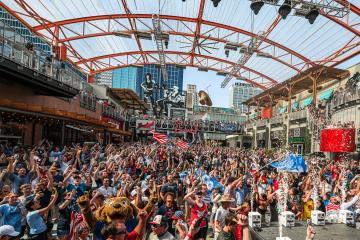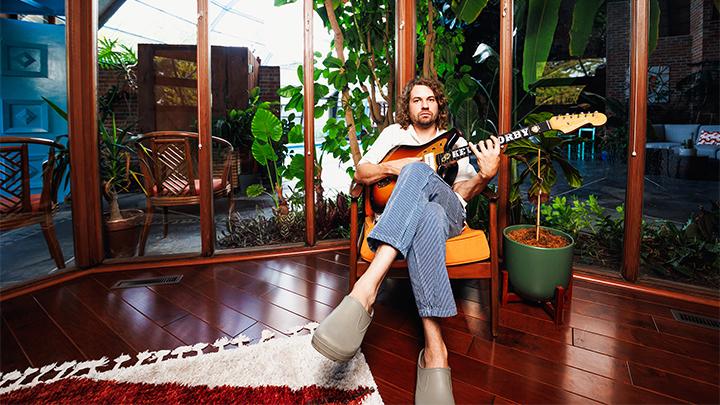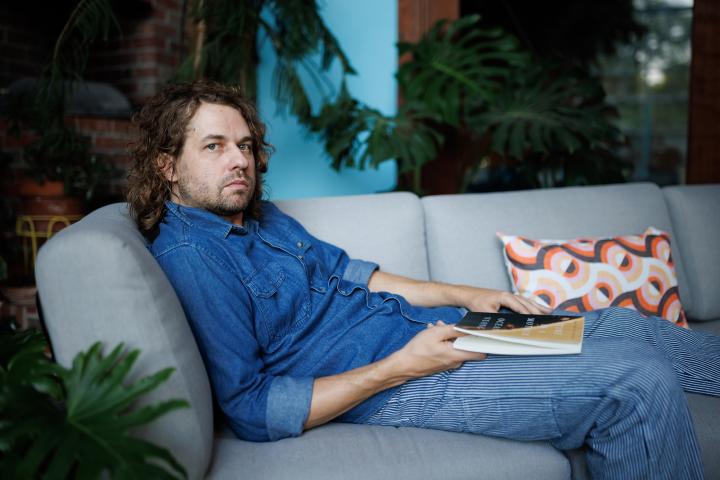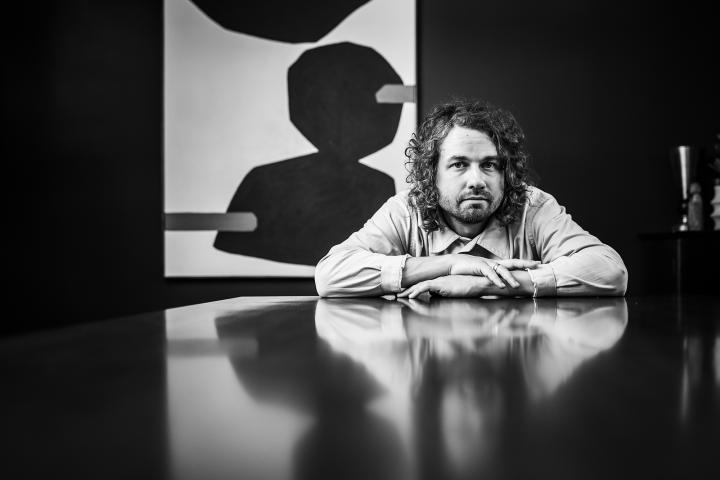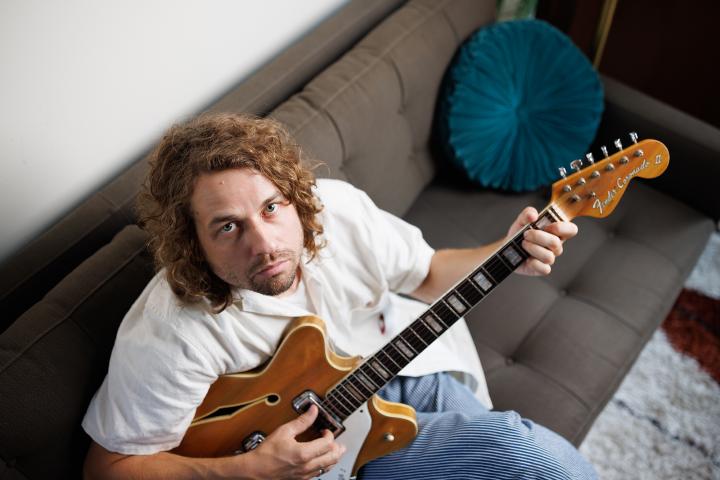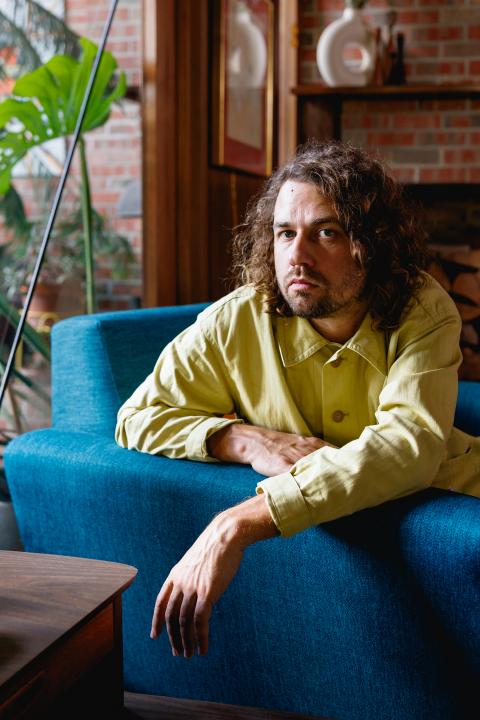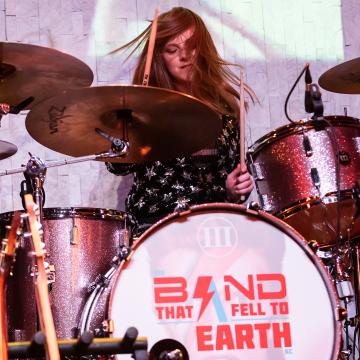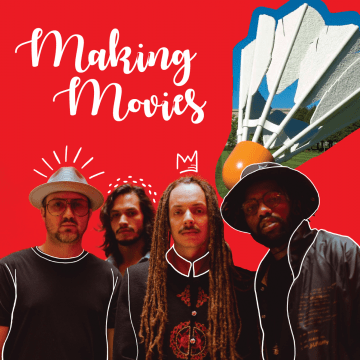Kevin Morby
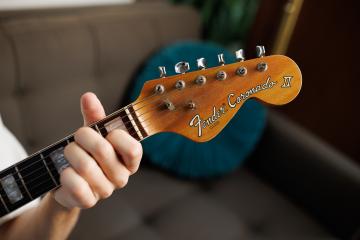
Some of Kevin Morby’s most formative moments took place in hollowed-out warehouses, ramshackle punk basements and abandoned loft spaces across Kansas City — sweating it out shoulder-to-shoulder with other kids, mesmerized by clattering rhythms and crunchy guitars.
It was the early 2000s, a time when the Crossroads Arts District was still in its infancy, the historic West Bottoms was sparsely dotted with haunted houses and the city center was largely untouched after business hours. But to Kevin and friends, it was a playground of possibility — one that would lay the groundwork for an esteemed career.
With seven records in 10 years, including the heavily acclaimed “This Is A Photograph,” Kevin has become a pillar of the indie music world. A quick-witted observationist, the singer-songwriter has a penchant for turning the mundane into the sacred — rambling through lonesome prairies and whirring city streets into the liminal spaces we take for granted. His Midwestern roots inspire muted cerebral folk songs with gentle but deliberate paces, in contrast with more turbulent tunes that roll to a pensive boil.
Born in Texas, Kevin and his family moved around the Midwest before landing in the serene KC suburb of Overland Park, Kansas, when he was in fifth grade. It was also around then that his curiosity would point him to music as a way to express himself.
As a freshman at Blue Valley Northwest, Kevin began penning songs and performing under his own name, later joining friends in a band called The Creepy Aliens. Suddenly, he was leaving the comfort of his home, immersing himself in every genre imaginable at underground clubs in the urban core.
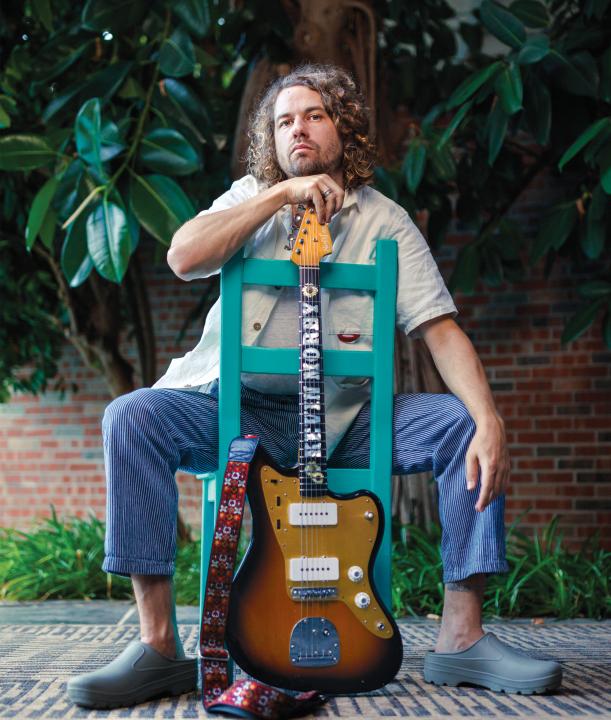
“I remember calling my mom on a friend’s cell phone the first time I went down to a show,” he says. “She asked where I was and I had to look at the street sign — it was like, 13th and Grand. We lived at 135th and Antioch. I didn’t know numbers could go that low.”
This music scene was not only Kevin’s gateway to the city proper, but to the prospect that it could become his life’s work. “Saying that I wanted to be a musician ‘for a living’ felt strange because I didn’t understand that concept until I got into the DIY scene. I just wanted to be able to do it and see the world,” he recalls.
The Creepy Aliens would embark on short runs and link up with other DIY acts in the region — musicians self-producing, distributing and performing their own music — giving Kevin his first taste of touring. They’d swap shows and share bills, show up for one another in their respective towns, crash at each other’s apartments. “It all felt like an impossibility until I discovered this underground network where bands were literally doing it all themselves,” he mentions. “Once I accessed that knowledge, it felt like the world completely opened up.”
But Kevin knew he couldn’t forge that path here — not in the early aughts. Shortly after dropping out of high school and turning 18, he boarded a train to New York. Its DIY scene was on the rise, reminiscent of his circle in KC but on a global scale. The eyes and ears of the world were paying attention, and the bright-eyed Kansas wanderer found himself in the center of it all.
“There is a beautiful thing about not being surrounded by culture, so that when you find it, you can access it,” he says. “A lot of these NY kids were over everything by the time they turned 18 because they’d tried everything or knew every famous person or had been to every art gallery. They took it for granted because it was all right in front of them.”
Kevin, on the other hand, dove in and got to work. At 19, he started playing bass in Woods, another burgeoning act on the Brooklyn circuit. His bandmates were 10 years his senior — “real adults with real jobs and responsibilities.” Hurled into the life of a road warrior, he’d quickly learn the basics of hauling gear, wrapping cables, packing a van and riding in said van for 10 hours at a time, night after night.
As he got his bearings, Kevin felt freer to explore his own music. He and Cassie Ramone formed and co-fronted The Babies, which would give him a chance to test his material and lead a band. “This was a vehicle for my songwriting and my emotions,” he says. “It was a way to put a mask on my solo songwriting, to kind of cloak it in these other things.” The group would go on to release a self-titled album in 2011 and its follow up, “Our House On the Hill,” the next year.
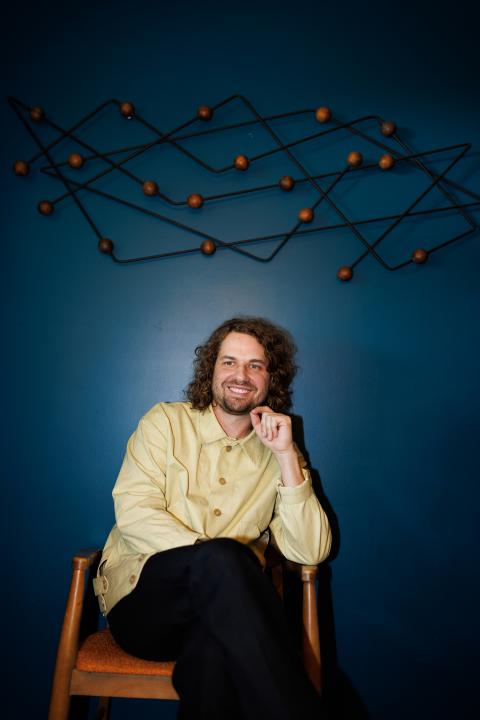
By then, Kevin’s beloved New York DIY scene was dwindling. Artists were being priced out, keeping them from fully immersing themselves in their careers. So, in 2013, he and Babies drummer Justin Sullivan relocated to the “cheap desert” of Los Angeles, moved into a “really big house for next to nothing,” and started working on Kevin’s debut solo album, “Harlem River.”
Now in his mid-20s, Kevin found himself at the vanguard of another nascent music scene. Artists he knew from the touring circuit were also heading to LA, eschewing the DIY microcosm for stronger foundations. “A whole new crop of bands were starting to take off. All these professional musicians were moving out there to have a go at it,” he says.
A new sound was emerging, where reflective solo songsters were taking center stage. Surrounded by delicate but dense sonic tapestries, it was lyrically imaginative and often more reminiscent of ‘60s folk luminaries and beat poets. Within the four years he lived in LA, Kevin’s name would become principal in that indie lexicon. He released three more acclaimed albums: “Still Life” (2014), “Singing Saw” (2016) and “City Music” (2017).
By then, Kevin would be nearing his thirties and again finding himself in transition. The cost of living in LA, let alone any major metro area, had become onerous. He began dating Katie Crutchfield, who was forging her own solo project as Waxahatchee, and whose life was following a similar trajectory. Katie grew up in the small underground punk scene of Birmingham, Alabama, making music with twin sister Allison. She and Kevin had moved around the country for their careers and spent most of their time on the road. Both had four albums to their credits, and their latest releases (Kevin’s “City Music” and Waxahatchee’s “Out in the Storm”) leaned into heavier electric sounds than expressed in previous works.
The pair would soon share another commonality, one that was far more fortuitous: an abiding love for Kansas City.
After being signed to Dead Oceans in 2015, Kevin took the advice of fellow musicians Bradford Cox and Kim Deal before him: Once you make any real money from music, buy a house. He snagged one in downtown Overland Park and rented it out to a friend. By 2017, the friend moved out, so Kevin would come back for a couple of months to tend to it, then return to LA. Katie would visit him in KC when their schedules aligned. She, too, was in transition, ready to leave Philadelphia.
KC feels like it belongs to me. As much as I love NY and LA, they sort of belong to everybody. I have my spots here, and they feel like they’re sacred and secret. You can’t have that in bigger cities.
“I was in a funny place where I was super jaded about where I was gonna live,” Katie says. “I had been everywhere in America 17 times. I didn’t want to be in NY, LA, Chicago or back south. I just couldn’t make up my mind… I was just sort of floating around.”
But something happened when she visited KC with her partner for the first time. “I remember being really struck by how much I liked it,” she says. “It was a feeling I hadn’t had in a long time, where I went to a new place and felt so connected to it.” Though she hadn’t considered moving to KC, Katie started seeing it as a wonderful middle ground that afforded her all the resources of a big city without all the noise. She began spending more time at Kevin’s Overland Park house between gigs, finding unexpected refuge.
In 2018, she made a life-altering decision, vowing to get sober and take an entire year off touring — an almost unheard-of choice for a musician whose primary income came through a life on the road.
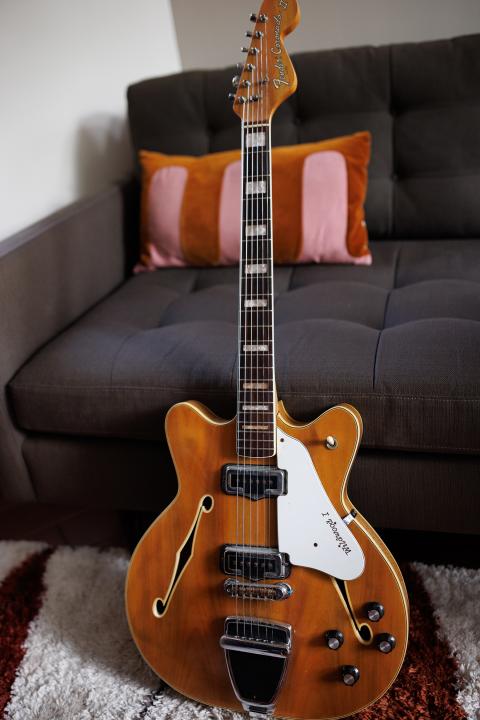
“I was burning the candle at both ends — that’s what I had to do to earn a living,” she recalls. “It was scary, but something told me that’s what I needed to do to make the type of record that I really wanted to make.”
For the better part of that year, Katie cozied up in Kevin’s home while he was on tour — in the back shed studio area he dubbed The Little Los Angeles. “It was just this perfect little space. There was a piano, music gear everywhere,” she says. “I really felt like I could come here and feel that sense of solitude because I didn’t know many people here at the time, but because it had everything I needed, I could still go out and find really great food. [KC] has been really conducive to songwriting for me in that way.”
There, she would “spin silence into gold,” gifting those songs to the world in March 2020 and calling the effort “Saint Cloud.” A major breakthrough, the album doubled Waxahatchee’s fanbase and became a sanctuary for a world forced into abrupt lockdown. Katie’s own self-imposed isolation tapped into an elemental part of her musical identity, extracting pieces of her Southern roots while taking inspiration from the understated beauty of her new surroundings.
“It’s such a big part of it for me to live in a place like KC,” she says, adding that the ambient chatter of industry towns wasn’t working for her approach to songwriting. “Something about it makes my entire process feel more my own. It’s always important for me to shut the world out when I’m trying to receive some type of vision of what’s next, and I really needed that spaciousness to do that.”
As Kevin watched his girlfriend fall in love with KC, he found himself doing the same. “There was something about seeing KC through Katie’s eyes that made it easier for me to see it in a new perspective, rather than feeling like I was back in high school and nothing had changed.”
He also recognized how much it actually had changed. The modest metropolis of his youth had undergone a major transformation in the previous two decades — becoming an affordable, innovative Midwestern hub for artists, entrepreneurs, restaurateurs, tech startups and international sporting events. The DIY scene of Kevin’s teenage years had given way to a bustling community of musicians, many of whom were making the national scene with KC as their home base.
As he grew to appreciate it in a new light, Kevin started to see his life in Kansas City as a bounty. “The fact that I started making a living off my passion made me think, I really can’t mess this up,” he says. After more than a decade of paying his dues, he discovered that building a life here would reap greater rewards. Over the pandemic, Kevin and Katie put down roots and bought a home together in KC.
While their stars rise, the indie-rock couple feels a palpable sense of civic pride as Kansas City continues its renaissance. Both point to the star-studded Big Slick Celebrity Weekend, where they performed in the summer of 2024. Founded in 2010 by KC natives Paul Rudd, Jason Sudeikis and Rob Riggle, the annual gathering includes a slew of A-listers who come together for a softball game, concert and other events raising millions for local hospital, Children’s Mercy.
“It was cool to look around that room and think, all these people are from KC. Everyone has gone out and done something amazing but still reps their hometown and loves it so much. It’s such an inspiring place in that way,” Katie says. Kevin adds that it’s a “very Kansas City thing” to do — for these celebrities to give back to the community that molded them.
He gets to the heart of what he feels is so unique and personal about being from Kansas City. “KC feels like it belongs to me,” he says. “As much as I love NY and LA, they sort of belong to everybody. I have my spots here, and they feel like they’re sacred and secret. You can’t have that in bigger cities.”
In addition to favorite spots like Mutual Musicians Foundation, Big Mood Natural Wines, Earl’s Premier and Baramee Thai Bistro, Kevin and Katie have found an inspiring sense of place across KC’s byways. For Kevin, it’s vantage points like the northland bridges over the Missouri River, the Western Auto sign and suburban haunts he took for granted as a kid, like Glenwood Arts Theater and the former sites of The Rio and Metcalf South Mall in Overland Park.
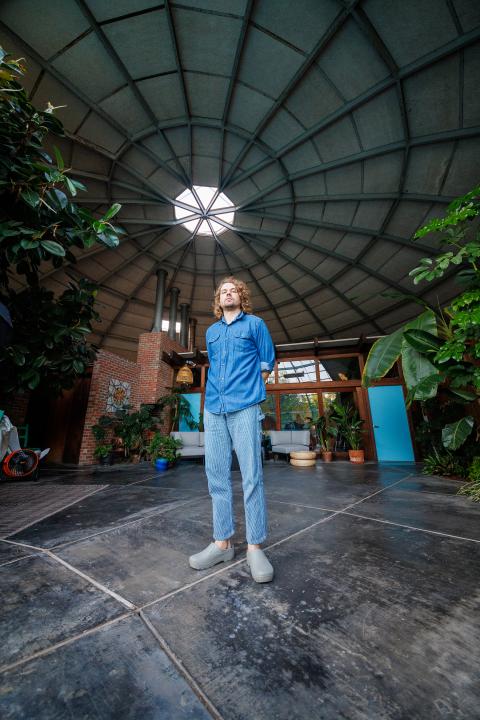
To cap the conversation, Kevin shares an anecdote he’d recently heard about a fellow KC native — a musician whose shadow still looms large over the city nearly a century later.
“Someone told me that Charlie Parker couldn’t wait to get out of here,” he says. The flourishing KC jazz scene of the 1930s was ground zero for the saxophonist’s improvisational style, but like Kevin, he would have to leave in order for his sound to evolve. Something about that story stuck with the ruminative troubadour.
“There’s a happy ending to not agreeing with a place, going out and doing your thing, and then, at least for me, coming back,” Kevin says.
-
 What KC spots do you miss when you’re on tour?
What KC spots do you miss when you’re on tour?Kevin: When I’m at my most homesick — I’m on tour, I’m super far away, I’ve been gone for weeks at a time — I just envision this neighborhood (downtown Overland Park). It’s the most comforting thought in my mind, being back here. My favorite bar is Big Mood. The Mutual Musicians Foundation is so unique; I feel like I can’t get that anywhere else. I love taking jazz musician friends there from around the world — it blows their minds. And then, of course, the barbecue. Joe’s, Slap’s and Arthur Bryant’s are my three, but a Z-Man from Joe’s… I’ll die on that hill.
Katie: I have such a routine here now, and so many friends and spots that I get home and I’m so excited to go to. KC barbecue is important to me. Kevin and I love spots like Earl’s Premier, Baramee, Big Mood.
-
 What KC spots give you an inspiring sense of place?
What KC spots give you an inspiring sense of place?Kevin: The Western Auto sign is an iconic KC thing I love so much. At a Big Slick afterparty at The Westin, I watched the sun come up with the sign illuminated. That vantage point was really cool. I love the Missouri River, any of the bridges going to the Northland.
Katie: Every record I make is so chock-full of places I like to bring to life. “Lone Star Lake” (on the new record, “Tigers Blood”) is my little gift to Kansas Citians. I had that melody when I wrote a lot of “Saint Cloud,” and kept coming back to it. After I visited that lake, it just came out.
-
 Favorite artists and bands from KC?
Favorite artists and bands from KC?Kevin: Shy Boys, The Greeting Committee. Making Movies is a Latin band. The Salvation Choir is a Congolese band — I don’t know where that exists other than here. I feel like I see the same bands in a lot of other places. It’s so amazing, the variety here.
Katie: I catch up on music when I’m home because I’m walking or driving around more. One of my favorite KC artists is 1010Benja, who put out a new album a few weeks after “Tigers Blood” came out. My other favorite local band is Salvation Choir. I always try to see them when they’re in town.
-
 What songs remind you of KC?
What songs remind you of KC?Kevin: Songs I discovered for the first time in my teenage years. I remember when “The Glow Part 2” by The Microphones came out and I listened to it, driving around KC in the snow with headphones on. Kimya Dawson’s song “Loose Lips.” “Sadie” by Joanna Newsom. “Back When I was Four” by Jeffrey Lewis. These were songs I was listening to in my Chevy Malibu on my tape deck.
Katie: Kevin’s music obviously reminds me of KC — especially “Sundowner” (from 2020). That record is so tethered to my early years here, so I feel like even just seeing him perform some of those songs live brings me back to us being home and hearing him work on that record.
